Nelson Dalzell, a farmer from rural Canterbury, like many New Zealanders, was proud to serve his country. Serving in the 3rd Infantry division, he lined up alongside two men for the landing at Guadalcanal in the Pacific Ocean. History would tell us it turned into six-month battle for territory with thousands of lives lost.
At 6ft 2in and over 100kgs, Dalzell stood out, but as they neared the mainland, a Japanese bomb hit their boat. The soldier to his right died instantly, and the young Kiwi to his left got away without a scratch. Dalzell, in the middle, was severely wounded. His leg lacerated by shrapnel. So grave were his injuries that an amputation was discussed by on-site medics but his burgeoning ambition as a rugby player and an iron will saw Dalzell firmly rebuffing their suggestion. He had other ideas and the leg stayed. There followed two years in convalescence.
A man of the land, and described as a ‘tough bugger’, Dalzell was left with a massive hole in his shin, so when he returned to the playing field he would routinely place a piece of wood to fill the gap, tape it up, roll his sock over it and head onto the field to play for Culverden in North Canterbury.
The dream to represent the All Blacks never left him and he was selected for the 1953-54 six-month tour to Britain, Ireland and France at the ripe old age of 32. Friends and family stepped in to run the sheep farm to allow him to chase a dream. A much-loved tourist, he was nicknamed ‘dad’ by his younger team-mates and showed innate leadership qualities.
In later life, Dalzell was to spawn a legion of All Blacks. Graeme Higginson, a nuggety All Black married one of his daughters, while another married a young farming student Braeden Whitelock.
That union spawned four gifted sons; George and Adam, with Luke the youngest, excelled in rugby. It was, however, the third-born son who has gone on to become one of the greatest ever to wear the silver fern. Step forward Samuel Lawrence Whitelock.
Now 34, and the third-most-capped player of all time, behind Alun Wyn Jones and Richie McCaw, he will enter what is likely to be his final season as an All Black, by heading to the UK for a warm-up games at Twickenham against the Springboks, before moving onto France to attempt to claim a fourth World Cup for the men in black.
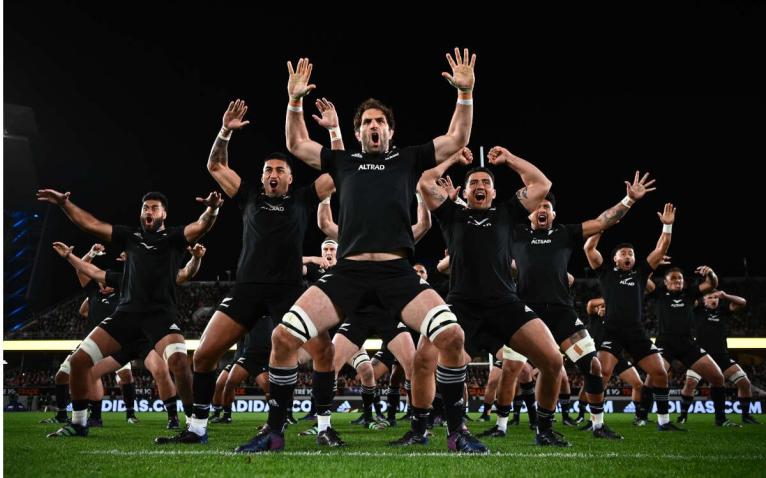
Unsurprisingly, breaking records and looking in his rear-view mirror is not for the 6ft 8in second-row. With Super Rugby Pacific up and running, he will start the season for the Crusaders rubbing shoulders with fresh young bucks and while statisticians will tell you he could surpass McCaw’s 149-cap record later this year, such frippery is lost on a player who eschews garlands and deification.
Whitelock says his age – grey hairs are notable on his chin – is already gaining much mirth with young whippersnappers, with some calling him ‘dad’, like his grandfather, on the recent autumn tour, because Dane Coles wasn’t touring.
For the big second-row, there could be no finer tribute than to be nicknamed after his grandfather, anyway. “Mum tells me that the shrapnel would come to the surface in his hand and once a year he’d have it taken out. His was a story of that time. Every rugby player had a connection to the war, which is why playing with the poppy has such resonance.”
The pressure is there for every Kiwi kid. Everyone wants to be an All Black or a Black Fern. It was no different for us. We’re fortunate to have had a few All Blacks sprinkled throughout the family.
With such an illustrious family tree, you wonder if Whitelock had any extra pressure to continue the family legacy, and not pursue a career in banking, dentistry or more likely farming. “Look, the pressure is there for every Kiwi kid. Everyone wants to be an All Black or a Black Fern. It was no different for us. We’re fortunate to have had a few All Blacks sprinkled throughout the family. My grandfather, my uncle and my brothers, who have played for the NZ Colts. Mum tells me she scored a two tries in her first and only game before the referee tackled her. I think she’d have gone pretty good if there was the pathway for her back then!”
Whitelock’s bucolic childhood was idyllic, if hectic. With three lively brothers to keep him entertained, the Crusader says the family tree didn’t register. “Dad would have guys like Gary (Knight) and Mark (Shaw) round. As kids, we were so desperate to meet All Blacks but we didn’t cotton on that they were dad’s mates. I remember looking through a sports book and seeing the Flower Bomb Tour of South Africa, and seeing Gary (Knight), ‘and the penny dropped’. I was always obsessed with sport, I just didn’t know where it would take me.”
What was in Whitelock’s DNA was a determination to keep improving, to keep pushing the dial to be the best, and that drive was apparent in his teens.
His PE teacher at Feilding High, Rob Jones, a friend of this writer, spoke of his motivation. How he would spend extra hours doing backflips on a trampoline to help with his balance and dexterity. Jones remembers asking Whitelock to write down his goals in 2008 as an 18-year-old and being told in no uncertain terms that that he ‘wanted to play for the All Blacks at the 2011 Rugby World Cup’. Three years later, he was part of the squad that lifted a first World Cup since 1987.
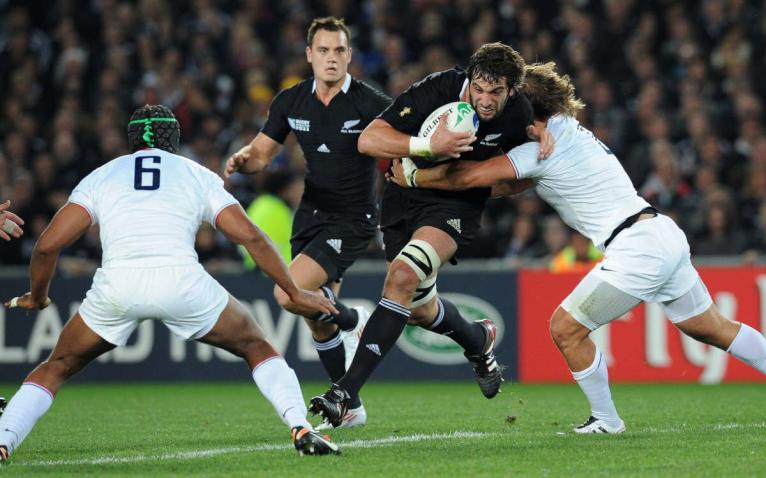
So was it nature of nurture? Was he always destined to become an All Black? “Well, mum and dad have a couple of race horses. Mum always pipes up that 90 per cent of the breeding comes from the mare, so there’s a fair bit of family rivalry around how we turned out like we did. I had a normal upbringing. I gave a lot of sports a go and I wouldn’t have been the rugby player I am without the mixed-sports upbringing. My height helped. I liked basketball but must have been pretty terrible at it because I got ‘most improved player’ four times in a row. I remember a layup I attempted, when the ball came off the backboard, didn’t hit the rim and crash landed on halfway. Fortunately, I was a bit small for the NBA.”
Whitelock smiles at these observations, and childhood memories, downplaying his natural gifts. “At the start, as brothers, we all played in different positions. Some played on the wing or first-five eighth, but for me, everyone was like, ‘you’re going to be a lock’, and I’m like, ‘I don’t want to be a lock’, so I tried to play No 8 for a while, or blindside, but it got to the stage when I was a head and shoulder’s taller than everyone else so I had no choice.”
Now entering his 14th year as an All Black, by proxy he has become public property. Indeed, Whitelock has had to learn how to deal with the glare of publicity and act as a role model. Never has this been more apparent than when his beloved Canterbury was hit by an earthquake in 2011, and again in 2019 when the city was hit by a terrorist shooting on a mosque that left 51 people dead. Is there a responsibility to on an All Black to speak up in times of crisis? “The community side is big and we’re part of that. The earthquake and the mosque shooting definitely hit me hard but sometimes you have to allow people who know more about the situations to speak up. You also realise that by spending that little bit of time with those affected, you can help. They say time is cheap, and I believe you can have more impact on a personal level.”
The first thing is doing my job well. That’s the bedrock of everything. Every rugby player has a different job whether it’s a lock, half-back or full-back. It’s certainly easier to lead when you’re doing what you need to do.
Whitelock on leadership
With three kids under five and wife Hannah doing a highly-creditable job keeping the show on the road, Whitelock is well-versed in the meet and greet with the next generation, after a career globetrotting the world with star-struck fans.
He has a few tricks up his sleeve, to inspire starry-eyed kids. “If someone who is under 10 walks down the road and recognises you, taking five or ten seconds to say hello, asking them how their rugby is going or what sports they’re interested in costs nothing. I picked up tricks from some of the older guys, like DC (Dan Carter). He would look at their lunch boxes and see a name, if it was Jonny, he’d say, ‘hey Jonny, how are you?’ and all of a sudden they’d think you were the best thing since sliced bread. If I’m asked by young kids how to be an All Black, and especially now I’m a father, I’ll give the parents a wink, and say, ‘do your homework, and be nice to mum and dad’. It works a treat.”
Captain of the All Blacks during the tour to Europe, you would assuage that he picked up a few tips from the likes of Richie McCaw and Kieran Read along the way, so what does leadership look like? “I would say the first thing is doing my job well. That’s the bedrock of everything. Every rugby player has a different job whether it’s a lock, half-back or full-back. It’s certainly easier to lead when you’re doing what you need to do. A lot of people forget that, especially when you’re younger. People tell you to talk more but the easiest way to do that is through your actions. If everyone in your team knows you’re playing well, what you say has more power.”
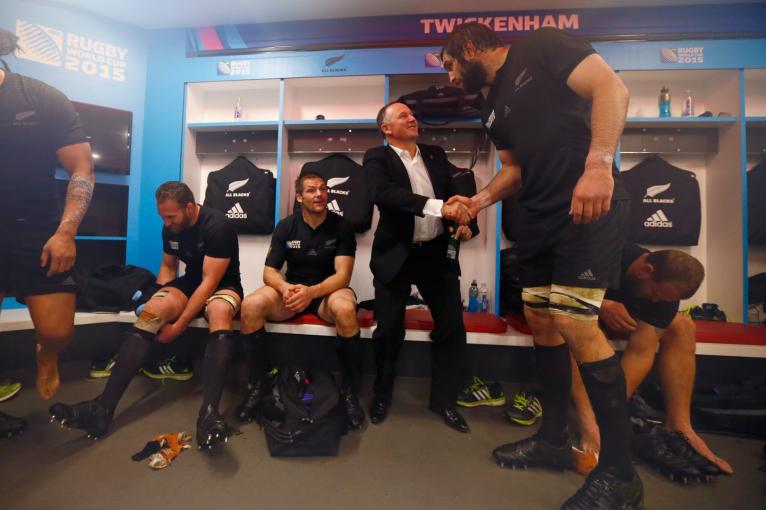
While he eschews the spotlight, red carpet events and glitz, in a team environment, Whitelock says he is more than throw in his penneth. “I’ve never been shy about voicing my opinion. That comes from my upbringing with three brothers. If you’re shy, you’ll miss out on everything – you have to force your way in sometimes. With leadership, there are always things you can do better. Whether that’s what you’re saying, how you’re saying it or your body language. As my career has gone along, I’ve taken more enjoyment from that side of things. How to change those one per centers. That’s not just rugby, that’s life in general, being a parent, a husband, a brother, a son, a team-mate.”
As for the spotlight, where he is one of the most famous sportsmen in New Zealand, Whitelock says disguise is the name of the game. “Ha, well I’m pretty short beard-wise, so I’m flying under the radar right now,” he smiles. “I probably get recognised most in New Zealand, but it’s a small place and everyone is pretty good. If they see me with my young family and one of the kids is misbehaving they’ll leave us alone! It’s very humbling to be recognised and still something I find a bit weird. I can’t fathom why people would just pitch up and have a yarn.”
I think when we do retire, we’ll live about 25 minutes away from each other so I’m sure we’ll catch up and go over the good old times. We haven’t had a lot of time rooming together, because he’s a bit messy.
Whitelock on Brodie Retallick
While Whitelock would be happy to go about his daily business incognito, it’s little surprise he has become lauded in rugby circles. Against England in November, Whitelock and Brodie Retallick became the most capped pairing in Test rugby history, surpassing the legendary Bakkies Botha and Victor Matfield. This brackets the duo into the ‘goat’ status in the engine room, which Whitelock gamely swats away. “People compare us to those two, of course. I remember when Bakkies and Victor were playing. Bakkies would joke, Victor was the brains, I’m the brawn and the good looking one, but I’m not going to go down that road. Our relationship is great. I think when we do retire, we’ll live about 25 minutes away from each other so I’m sure we’ll catch up and go over the good old times. We haven’t had a lot of time rooming together, because he’s a bit messy but he ends up wearing the right stuff, so that’s okay.”
While he has spent most of his time with the Canterbury Crusaders, like any elite professional nomad, he has had a stint in Japan, and who knows, could end up in the Top 14 after the World Cup if the right offer was wafted under his nose. “We played at Panasonic which was based in Ota-Gunma district after the Japan World Cup. The thing I really enjoyed was when I walked into the club I didn’t know who the CEO was, the coach or the players. That’s where having a phone in your pocket and having Google Translate came in useful. Everything was novel. It was an awesome culture, totally different to New Zealand. That’s where the language of rugby finds a way. If someone is in space and wants to score a try, they’re yelling at you and you have to somehow get it to them.”
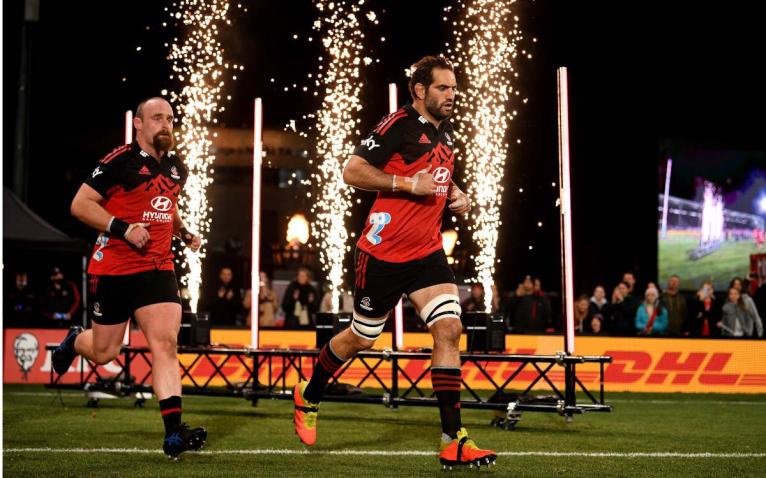
The pandemic hit New Zealand hard, as it was cut off from the rest of the world. With the South African franchises heading North, many have openly pondered whether it had a detrimental affect on rugby in New Zealand, with them losing an almost unprecedented four Tests in 2022 when the world opened up again.
“As a country, at the bottom of the world, we had an option to shut the borders and that’s what happened. For us as a team, we had to travel back into the country and have two weeks in isolation. It was a challenging time for every rugby-playing nation. I think we have enough variation of playing styles but what you can’t replicate is playing at some of these packed stadiums, whether that’s in South Africa, the UK or Argentina. You have to get the feel for that.”
In the aftermath of those losses to South Africa, Ireland (twice) and Argentina, the opprobrium rained down on the All Blacks, with Ian Foster bearing the brunt from the local media. The sacrificial lambs were Brad Mooar and John Plumtree, who paid for the uncharacteristic downturn with their jobs. Like all his team-mates, Whitelock had to don a tin hat and keep his head down. “As a young player at the 2011 World Cup, the best advice I was ever given was, ‘don’t read a newspaper’. Someone said, if you want to look at the pictures that’s fine but don’t read anything. I said, ‘what do you mean?’ and they’re like, ‘it’s just someone’s opinion’ and in the world we live in now with social media, it’s probably harder to get away from it. With something tangible like a paper, you can put it down, whereas with a phone, everyone carries it around.”
There’s no point me saying, ‘I want to get to 150 caps’. You’ve got to do every test match along the way because if you’re not playing well between now and then, you’re not going to get there.
What Whitelock has always tried to do; win, lose or draw is put himself first and play well. It’s something he is unapologetic about. “It may sound simple, even selfish, but if you can do that, everything tends to work out. I’ve had that advice passed down from some outstanding players over the years. You can worry about a million things, but if you catch your lineout ball, make your tackles, do your carrying, then all of a sudden everything you do is of a benefit to the team.”
As for goals left to achieve for someone with two World Cup winning medals in his locker, Whitelock isn’t getting ahead of himself. “There are goals I am chasing but the biggest thing is dealing with one week at a time. Those cliches are there for a reason. There’s no point me saying, ‘I want to get to 150 caps’. You’ve got to do every test match along the way because if you’re not playing well between now and then, you’re not going to get there. Hopefully I’ll finish in New Zealand playing, but I’m pretty open to most things. It’s not my decision anymore, it’s a joint decision with my wife and kids.”
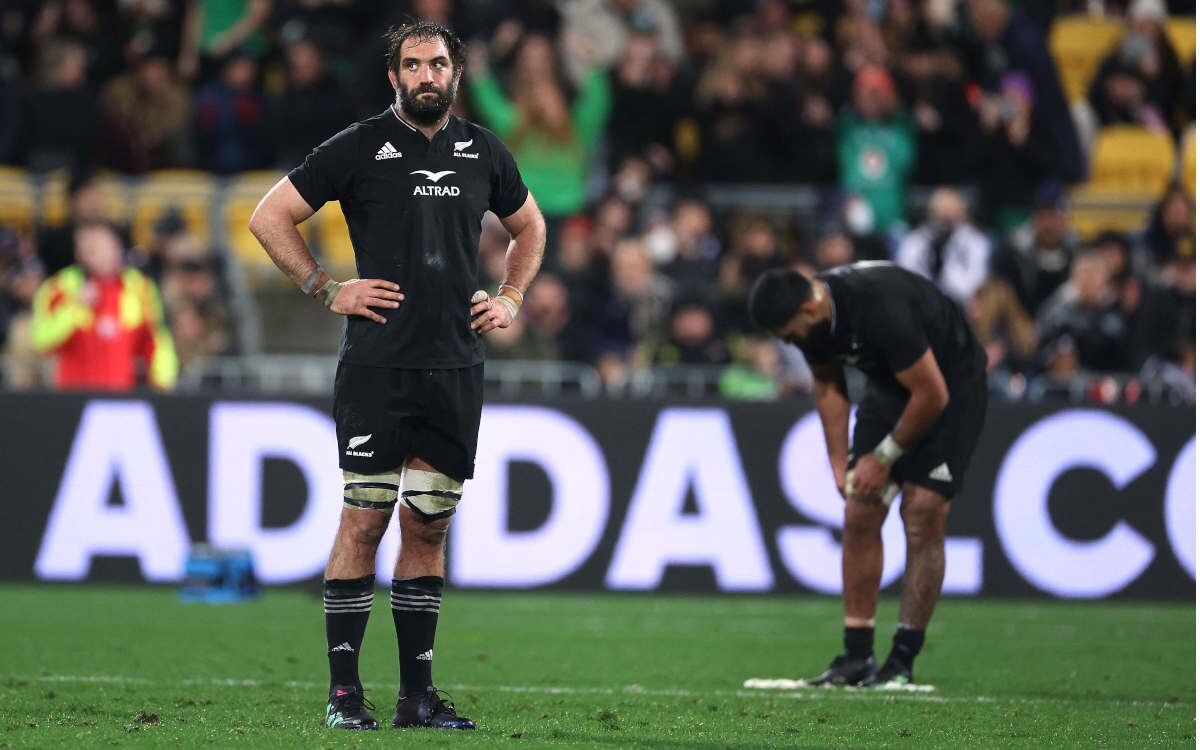
As for the future, Whitelock is still figuring it out. He will turn 35 during the World Cup. He is heavily invested in being a prominent voice for farming at home but does think he’ll be drawn back in some way to rugby in some shape or form. “I’ve been privileged to be coached by some amazing people, whether that’s at junior level, U10s, and right through to international level. I’d hate not to pass on that knowledge, whether that’s to rugby or to another sport or to my daughter’s U8 hockey team, I don’t know. What I do know after watching the women’s World Cup is I’m not a very good spectator. I would like to have an influence on something where you have a bit of control.”
Like his grandfather, Whitelock grasped his opportunity through sweat, blood and tears, and only a cold-heart would wish to deny him his French swansong.



Comments
Join free and tell us what you really think!
Sign up for free